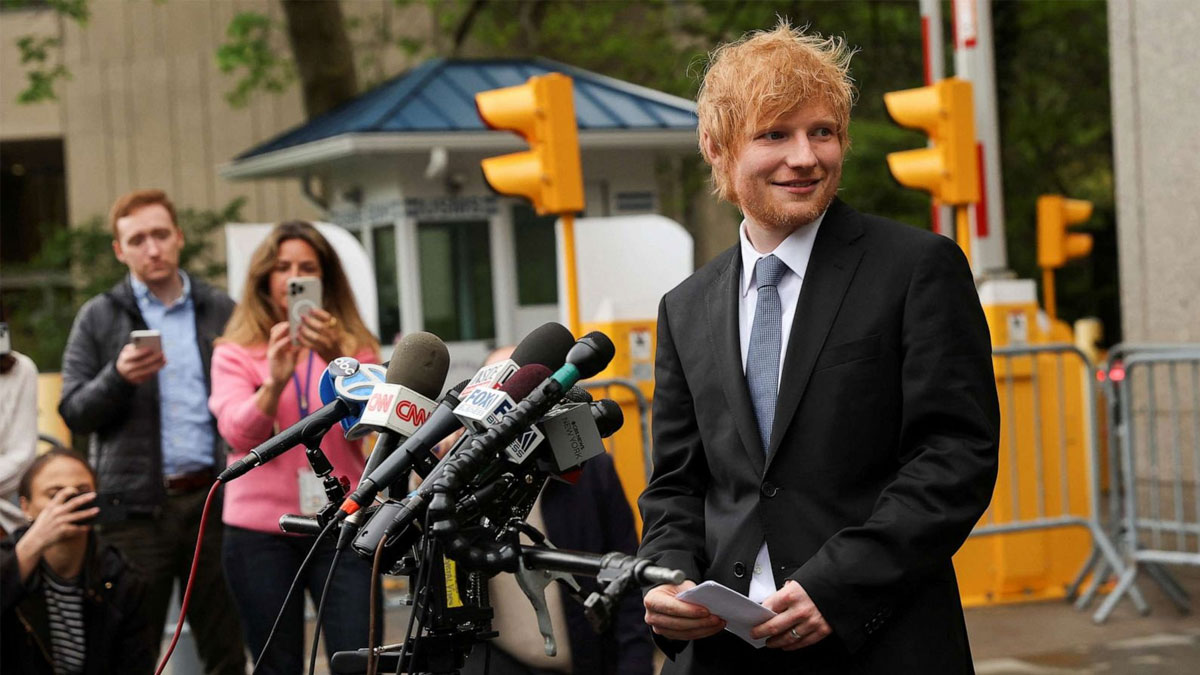
A US court determined that Ed Sheeran did not plagiarize Marvin Gaye’s Let’s Get It On when writing Thinking Out Loud. The British singer-songwriter had previously denied borrowing components of the song for his 2014 global smash.
Gaye’s co-writers heirs claimed Sheeran, Warner Music Group, and Sony Music Publishing owed them money for copyright violation. Sheeran had stated that if he was found guilty in the New York trial, he would give up his music career.
“If that happens, I’m done, I’m stopping,” he remarked when asked how the trial in Manhattan federal court was affecting him.
After jurors ruled that Sheeran “independently” created his song, he stood up and hugged his team. Outside of court, Sheeran stated that he was “obviously very happy” with the judgment.
“It looks like I’m not going to have to retire from my day job after all,” he said. “But at the same time, I am absolutely frustrated that baseless claims like this are allowed to go to court at all.
“If the jury had decided this matter the other way we might as well say goodbye to the creative freedom of songwriters.”
“I am not and will never allow myself to be a piggy bank for anyone to shake,” he added.
Ed Sheeran Accused of Copyright Infringement: Defense Argues Four-Chord Sequence is Commonly Used in Music
According to a musicologist for Sheeran’s defense, the four-chord sequence in question was utilized in various songs prior to Gaye’s smash in 1973.
Gaye’s co-writer Ed Townsend’s daughter, Kathryn Townsend Griffin, accused Sheeran of copyright violation. She moved quickly passed reporters, smoking what seemed to be a cigarillo and saying just, “God is good all the time, all the time God is good.”
Sheeran sang and played parts of Thinking Out Loud on the guitar during the civil trial. He stated he created the song with his friend Amy Wadge at home in England, and it was inspired by his grandparents and a new romantic connection he had just begun.
Ilene Farkas, Sheeran’s lawyer, told the jurors that the similarities between the two songs’ chord progressions and rhythms were “the letters of the alphabet of music.”
“These are basic musical building blocks that songwriters now and forever must be free to use, or all of us who love music will be poorer for it,” she said.
Keisha Rice, who represented Townsend’s heirs throughout the trial, stated that her clients were not claiming ownership of basic musical parts but rather “the way in which these common elements were uniquely combined.”
“Mr. Sheeran is counting on you to be very, very overwhelmed by his commercial success,” she said, urging jurors to use their “common sense” to decide whether the songs are similar.
Sheeran facing multiple copyright disputes
Last year, Sheeran won a copyright dispute in London’s High Court over his 2017 single Shape of You.
Sheeran is also facing allegations for Thinking Out Loud from a firm owned by investment banker David Pullman, which owns the song’s copyright.
Gaye’s heirs obtained a $5.3 million verdict in 2015 in a case alleging that the Robin Thicke and Pharrell Williams song Blurred Lines duplicated Gaye’s Got to Give It Up.
